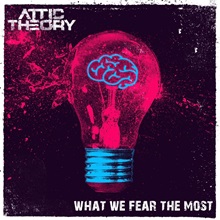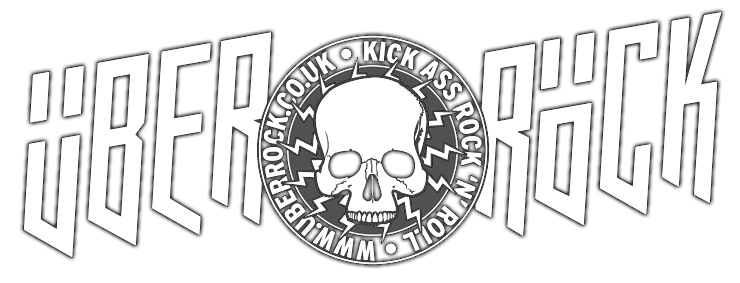By Georgia Smith
 Liverpool-based alternative groove rock six-piece Attic Theory celebrate the healing and unifying power of music on their much-awaited debut album ‘What We Fear The Most’, an ever-catchy, never-catchable exploration to the far corners of what can make a rock album.
Liverpool-based alternative groove rock six-piece Attic Theory celebrate the healing and unifying power of music on their much-awaited debut album ‘What We Fear The Most’, an ever-catchy, never-catchable exploration to the far corners of what can make a rock album.
Slow, heartfelt lyrical ballads rub up against the explosive riffs and thudding density of their heavier tracks – an odyssey into rock music held together with the solid lyrical core and the unyielding need to express the fundamental experiences of being human into some kind of musical experience. ‘What We Fear The Most’ is driven by the universal human experiences, and imbued with the raw power and feeling of the struggles of its creators- as a result the album is a richly populated landscape of lilting, thundering, and uncontrollable musical expression.
The opening track ‘Violent Delight’ is an immediately groovy track, infused with a self-confident attitude and a willingness to seize attention as soon as the album begins. Smooth forefronted vocals are given a grittier edge as the guitars twist and groove away from the undeniably rocky core into explosive winding solos and powerful riffs. ‘Violent Delight’ is a punch of power and promise- a burst onto the album and expression of Attic Theory’s core sounds and style. The emotional fuel of the album is immediately tangible and real- the heavy sequences of drums and gritty vocal edges- and even just from the first track, the solidly confident core of ‘What We Fear The Most’ makes itself known and undeniable.
The following track, ‘Tattooed Heart’, has a subtler sound- a slight movement away from the raw energy of its opener as if to promise early on the various directions that the album’s tracks will take. A winding opening explodes into a thick riff- again with a notable sense of musical originality as the melodies are strikingly fresh, inherently slightly different from what listeners may have come to expect from a rock album. This edge- of something new and catchy- elevates the impassioned leading vocals and their cleverly written lyrics. The track’s winding lighter sequences collapse into heavier ones; a blending of both sound styles heard so far as the album begins to move under its own steam, powered by its own internal force.
As the album moves towards the middle, it takes on a slightly darker, more pensive approach to the emotional explorations it delves into. ‘Papier Mache’, ‘Tapestry’ and ‘Narrow Lines’ are strikingly more heartfelt and brooding in not only their subject matter, but their presentation and performance. Incidentally it is these tracks that received such praise before the release of the album, with ‘Papier Mache’ being named Planet Rock Radio’s New Rock Show’s ‘Track Of The Week’ – suggesting that these darker ideas are Attic Theory’s best showcase of style.
‘Papier Mache’ and its slower, almost pensive opening and its dual leading vocals are striking and effective; a quintessentially rocky sound twisted into a more thoughtful, soulful direction. A slow descent from heavier bridges into slower and more intentionally forefronted guitar sequences creates a striking connection between the lyrical inspirations and the musical result. ‘Tapestry’ is cooler, more hollow-sounding in its thoughtfulness, whilst the vocals take on a more pained, almost shredded style; a fresh dimension of sound that imbibes the track with a darker, haunted tone. Deeply dirty, rocky sequences break into soaring guitar solos, tightly controlled as they twist and whine into the upper elements of the track and carve out a significantly darker edge than to the tracks that have preceded it.
‘Narrow Lines’ is a lyrically driven track, almost a story – forefronted guitars buoy the pained vocals and their desperate calls for help. Undeniably catchy despite the dark subject matter, ‘Narrow Lines’ is possibly one of the album’s most striking tracks- not only for the perfect balancing act of every element that Attic Theory are using- but for the fearless call for human connection and shameless expression of suffering. Such powerful, heavy concepts tied to the catchy chorus of this track is a deeply original construction with huge emotional and musical power contained within it.
‘Million Little Things’ showcases the acoustic-style sound that Attic Theory employ later on in the album- an initially quite mournful sound and introspective focus blossoms from the inside out into a slow build of lilting, hollow-sounding guitars and subtle bassline, and then explodes into a torn-sounding vocal performance, newly riotous guitars and deep, solid bass and drums. The track runs away with itself to a stunning finish. ‘Dare To Dream’ is similar- a lighter, bubblier sound erupts into a thick rock core with a deliciously gritty heaviness and density to the sound. The track’s concepts and constructs weave around each other into a culmination of a freshly dense style that hasn’t really been used on the album up until this point- a deep cacophony and echo of sounds to create something truly three-dimensional and tangible. The track contains a punchy, self-made power, and seems to propel itself to the soaring heights of its guitars and the gritty depths of its rock.
‘Sweet Parasite’ follows on from this renewed ferocity of sound; as though the emotional journey of ‘What We Fear The Most’ has tapped into some latent anger or bitterness. A grungy opening and ragged edge snaps into the chorus in what is probably the most intense drop on the album, and expands outwards into an intensely rocky, powerful sound, with this fresh edge of anger driving the cacophonous driving of its drums and guitars and the subtle poetry of the vocals slamming the high points of the chorus into something truly striking. The track embraces the hardest elements of their rocky sound and, following on from the more subtle, acoustic-style offerings of earlier, is all the more effective for having waited.
‘Your Light’ is almost ballad-y in its construction; a softer opening and another embrace of the more acoustic style of earlier on the album. This is an impressive show of range- to push on from possibly the heaviest track on the album into this more reserved, refined sounding one. A vocally-fronted lament with mournful guitars, ‘Your Light’ eventually collapses into the quintessential Attic Theory sound- the effectively struck balance between softness and harshness; feeling the emotional influence and expelling it. The impassioned vocal performance again is filled-out by the rockiness of the guitars, and blooms as earlier into the hollowness of their twisting, grungy rhythm.
‘A Brand New Burden’ continues this solid grittiness with a brooding vocal performance elevated by the real thudding, cacophonous collection of guitars and untamed basslines. The track contains the longest and most technically impressive guitar solo of the album, which not only elevates the track itself but the whole concept of Attic Theory as a band and what they are capable of including in their work. The track is the final punch of promise and skill, the final suggestion that the band can bend their own concepts and style to whichever concept they set out to marry it up to.
‘What We Fear The Most’ closes with ‘The Legacy’, which acts as a parting offering, an almost bittersweet final lyrical tale. It is again slower, more ballad-like and poetically written, carried by the musical and emotional collective that has not only influenced every track on this debut, but become a striking opportunity to experience it.
- ‘What We Fear The Most’ is out now.
